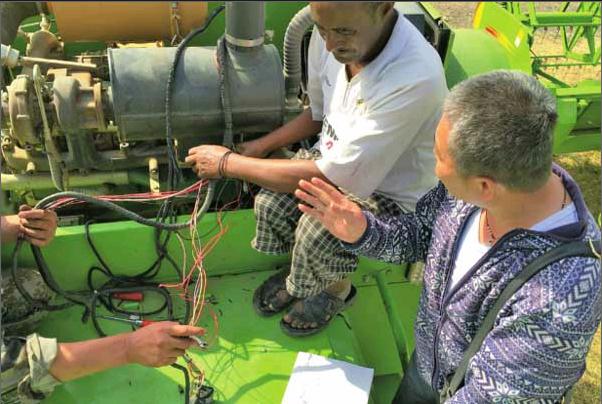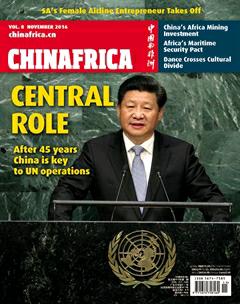Reaping a Bumper Harvest
By+Li+Xiaoyu

MAMUSH Mengestu had always worked as a driver in Ethiopia. But he got an unexpected “promotion” when in July 2016 he was selected by the Agriculture Department of Ethiopias Somali Regional State to become a combine-harvester operator in the wheat fields around Jijiga City, the regional capital. When faced with the new combine-harvester, Mamush was rather confused, because he had never operated this kind of heavy machinery before. To his own surprise, just a few hours later, he could easily harvest wheat with the machine, thanks in great part to the useful instructions provided by Liu Wenguang, an agricultural machinery expert from China.
Liu is the leader of the second batch of Chinas senior agricultural experts group to Ethiopia in 2015. Their work is part of the Sino-African technical cooperation projects announced by the Chinese Government at the Fourth Ministerial Conference of the Forum on China-Africa Cooperation in 2009. Liu and the other seven agricultural experts were dispatched to Ethiopia for a period of two years. These experts have precious experience in wheat, rice, cotton and edible fungus cultivation, as well as in irrigation machinery operation, sericulture and agricultural products storage and processing.
They landed in Addis Ababa, Ethiopia on October 21. The following day, the team met with Tesfaye Mengiste, Director General of Agricultural Extension Directorate, Ethiopian Ministry of Agriculture and Natural Resources. Tesfaye highlighted the two major bottlenecks that restrict the development of agriculture in Ethiopia: severe backwardness of crop harvesting techniques and dearth of agricultural mechanization technologies. Liu said helping Ethiopia solve these two problems has naturally become the focus of the experts group.
Machinery updating
Teff, a species of cereal grass native to Ethiopia, is the countrys main crop. More than 6.3 million farmers grow the grain, whose cultivation occupies 30 percent of Ethiopias farming land area. However, outdated traditional methods of cultivation are still being used up to this day as a result of the low level of agricultural mechanization. In addition, due to its low lodging resistance and small grains, teff is notoriously difficult to thresh and clean, and this has become a major obstacle for improving farmers income and for Ethiopias overall agricultural development.
“If this problem is solved, it will be a historic breakthrough for Ethiopia,” said Tamiru Habte, Director of the Agricultural Mechanization Directorate under Agricultural Extension Directorate.
In order to tackle this issue, in October 2015, the Chinese Academy of Agricultural Mechanization Sciences (CAAMS) and the Agricultural Extension Directorate of the Ethiopian Ministry of Agriculture and Natural Resources, supported by the Bill & Melinda Gates Foundation, jointly launched a program aimed at developing sowing, harvesting, threshing and cleaning machinery for small-scale teff-growing farmers in Ethiopia.
At the invitation of Ethiopias Ministry of Agriculture and Natural Resources, Liu became a member of the program. In charge of field testing, he also provided technical support for machinery update and data collection.
The CAAMS sent a batch of machines to Ethiopia just in time to carry out relevant tests before this years last harvest of teff. However, the machines could not arrive on schedule due to clearance delays at the Ethiopian border. Fortunately, Liu and other Chinese project partners saved the day by borrowing cutterrowers from Yuechen Industrial Co. Ltd., a Chinese manufacturer of agricultural machinery based in Ethiopia. The team was able to conduct experimental testing on time for the harvest, and results were most impressive.
Rolling out training
According to a famous Chinese saying, it is always better to teach a person to fish rather than to give him a fish. The experts group knew that in order to improve Ethiopias level of agricultural mechanization, developing and introducing advanced mechanized equipment was not enough; they also needed to expand local specialists level of technical skills. Therefore, the experts group attached great importance to giving training and guidance to Ethiopias agricultural technical personnel.
According to its annual work plan, the Agricultural Mechanization Directorate is planning to roll out both short-term and long-term training courses nationwide this year aimed at 9,000 and 47,000 trainees respectively. Liu actively took part in the training work.
Last February, at the invitation of the Agricultural Mechanization Directorate, Liu carried out training sessions in Jijiga and Gode Zones in the Somali Regional State. In order to complete his training task, upon arrival Liu consulted with officials of the Somali Regional State Livestock, Crop and Rural Development Bureau and local agricultural agencies. Soon after, he was training 100 people on how to reap sesame using a machine called a reaping-binder. Among his students were staff members from local agricultural bureaus, farmers and farming machinery operators.
During the training, Liu learned that Ethiopias Somali Regional State had already more than 150 Chinese-made agricultural machines. Unfortunately, as no local technicians knew how to operate and maintain them, the machines remained unused. Shocked by this waste of resources, Liu took the initiative to teach local technicians how to operate the agricultural machinery and even developed guidelines for them on how to install the equipment.
Selfless dedication
Unfortunately, not everything went as smoothly during the experts groups mission in Africa. Due to difficult working conditions, on June 21, Luo Xueyi, the groups rice expert, had to return to China after falling victim to a sudden perianal abscess. While recovering in China, he kept providing technical guidance to Ethiopian partners over the Internet.
When returning to Ethiopia, Luo did not forget to bring with him seven conventional and one hybrid rice varieties which are acutely needed in Ethiopia. On August 4, soon after landing, he rushed to give the rice varieties to his Ethiopian colleagues, despite the strenuous journey and his wounds still not fully healed. Luos diligence and enthusiasm gained him the admiration of his Ethiopian colleagues.
Identifying the needs of their Ethiopian counterparts, working tirelessly to address the issues and being brave and wise in the face of hardships, this is the impression Chinese agricultural experts will leave behind them in Ethiopia.

